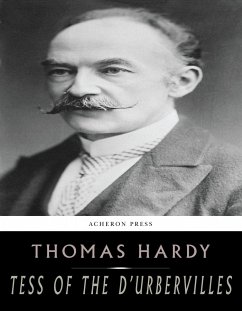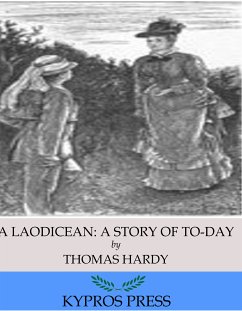
Tess of the d'Urbervilles: A Pure Woman (eBook, ePUB)
Versandkostenfrei!
Sofort per Download lieferbar
0,49 €
inkl. MwSt.
Weitere Ausgaben:

PAYBACK Punkte
0 °P sammeln!
Thomas Hardy's "Tess of the d'Urbervilles: A Pure Woman" is a poignant exploration of tragedy, social criticism, and the complexities of human relationships set in Victorian England. The novel employs a naturalistic style, rich in vivid imagery and emotional depth, effectively weaving Tess's plight against the rigid social structures and moral expectations of her time. The narrative scrutinizes the idyllic façade of rural life while exposing the harsh realities faced by individuals, particularly women, whose lives are governed by societal norms and class disparities. Hardy's intricate charact...
Thomas Hardy's "Tess of the d'Urbervilles: A Pure Woman" is a poignant exploration of tragedy, social criticism, and the complexities of human relationships set in Victorian England. The novel employs a naturalistic style, rich in vivid imagery and emotional depth, effectively weaving Tess's plight against the rigid social structures and moral expectations of her time. The narrative scrutinizes the idyllic façade of rural life while exposing the harsh realities faced by individuals, particularly women, whose lives are governed by societal norms and class disparities. Hardy's intricate characterization, especially of Tess, portrays her as a victim of fate, thus inviting readers to ponder the existential dilemmas she encounters throughout her life. Thomas Hardy, a novelist and poet deeply influenced by the cultural upheavals of the 19th century, infuses his work with an acute awareness of the struggles against determinism and social convention. His own experiences in rural England, along with a profound connection to the landscapes he described, shaped his portrayal of human suffering and resilience. Hardy's concern for women's rights and critiques of industrialization further illuminate the motivations behind creating Tess, who embodies both purity and the harsh realities of society. I wholeheartedly recommend "Tess of the d'Urbervilles" for readers seeking a rich, introspective literary experience that resonates with contemporary issues of gender, class, and morality. Hardy's masterful prose ensures that Tess's story remains timeless, compelling us to reflect on the nuanced interplay between fate and free will.
Dieser Download kann aus rechtlichen Gründen nur mit Rechnungsadresse in A, B, BG, CY, CZ, D, DK, EW, E, FIN, F, GR, H, IRL, I, LT, L, LR, M, NL, PL, P, R, S, SLO, SK ausgeliefert werden.













